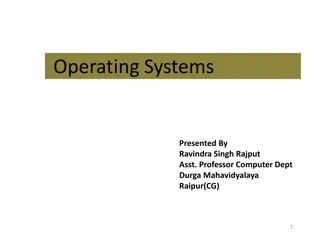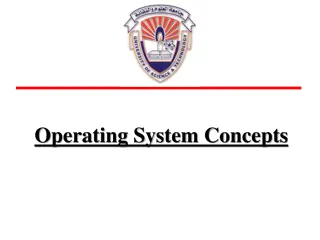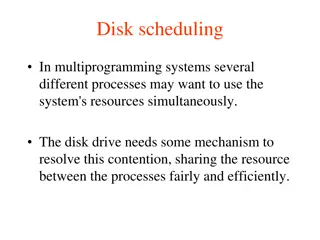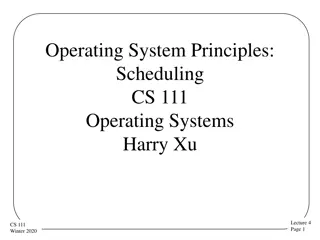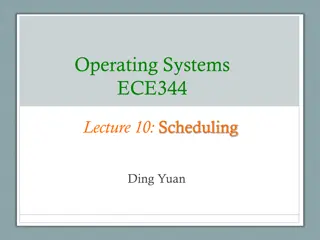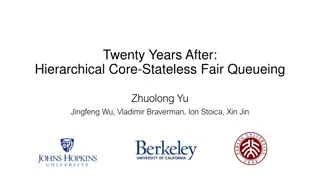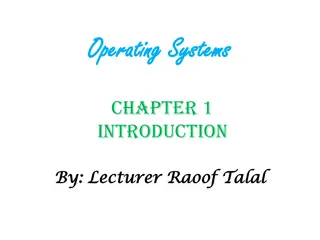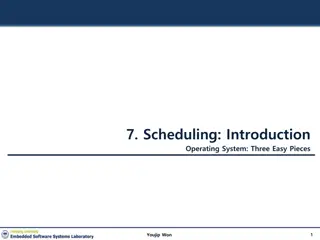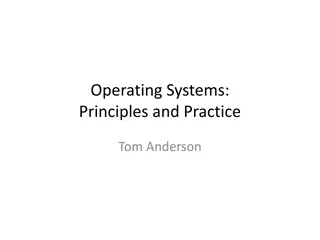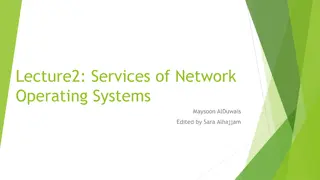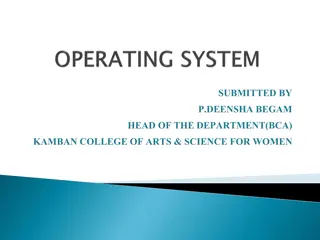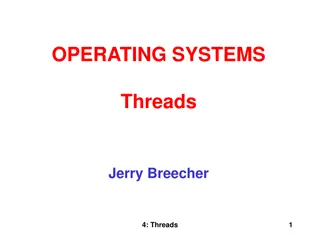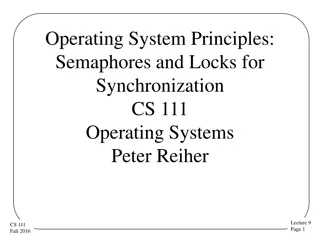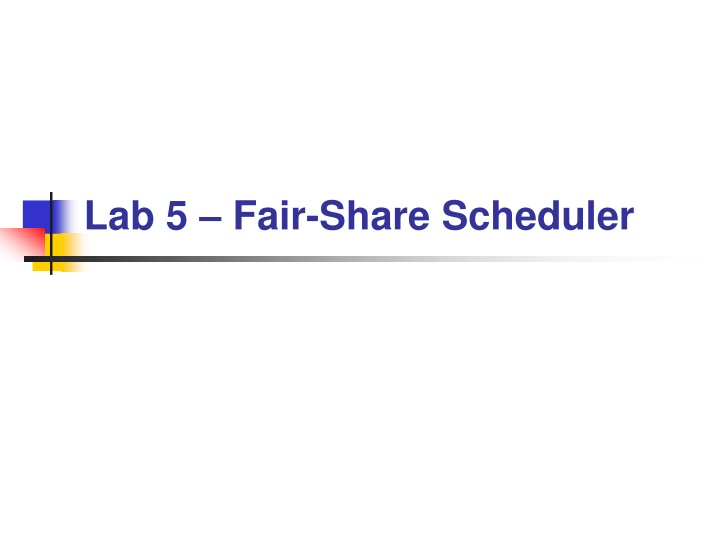
Fair-Share Scheduling in Computer Operating Systems
Project 5 discusses Fair-Share Scheduling (FSS) as a method of distributing CPU cycles among system users or groups for effective load balancing. The strategy ensures equal CPU usage allocation, maintaining system efficiency and quality of service. A layered approach involves grouping users and applying the algorithm within these groups. Examples and visual representations depict the distribution process. Fair-share scheduling offers a systematic way to allocate system resources fairly and efficiently.
Download Presentation

Please find below an Image/Link to download the presentation.
The content on the website is provided AS IS for your information and personal use only. It may not be sold, licensed, or shared on other websites without obtaining consent from the author. If you encounter any issues during the download, it is possible that the publisher has removed the file from their server.
You are allowed to download the files provided on this website for personal or commercial use, subject to the condition that they are used lawfully. All files are the property of their respective owners.
The content on the website is provided AS IS for your information and personal use only. It may not be sold, licensed, or shared on other websites without obtaining consent from the author.
E N D
Presentation Transcript
Project 5 FSS Scheduling is the method by which threads or processes are given access to system resources (e.g. processor time). Scheduling is usually concerned with load balancing a system effectively to achieve a target quality of service. Fair-share scheduling (FSS) is a scheduling strategy for computer operating systems in which the CPU usage is equally distributed among system users or groups, as opposed to equal distribution among processes. BYU CS 345 Project 5: Scheduling 2
Fair Scheduling Fair-share scheduling is a scheduling strategy for computer operating systems in which the CPU usage is equally distributed among system users or groups, as opposed to equal distribution among processes. For example, if four users (A,B,C,D) are concurrently executing one process each, the scheduler will logically divide the available CPU cycles such that each user gets 25% of the whole (100% / 4 = 25%). If user B starts a second process, each user will still receive 25% of the total cycles, but each of user B's processes will now use 12.5%. On the other hand, if a new user starts a process on the system, the scheduler will reapportion the available CPU cycles such that each user gets 20% of the whole (100% / 5 = 20%). BYU CS 345 Project 5: Scheduling 3
Fair Scheduling Another layer of abstraction allows us to partition users into groups, and apply the fair share algorithm to the groups as well. In this case, the available CPU cycles are divided first among the groups, then among the users within the groups, and then among the processes for that user. For example, if there are three groups (1,2,3) containing three, two, and four users respectively, the available CPU cycles will be distributed as follows: 100% / 3 groups = 33.3% per group Group 1: (33.3% / 3 users) = 11.1% per user Group 2: (33.3% / 2 users) = 16.7% per user Group 3: (33.3% / 4 users) = 8.3% per user BYU CS 345 Project 5: Scheduling 4
Example CS345 F2015 New Task[0] myShell 0>>p5 Starting Project 5 Group[0] = 17 Group[1] = 18 Group[2] = 10 Group[3] = 1 Group[4] = 20 Create parent1 with 17 children New Task[1] parent1 New Task[2] child_1a New Task[3] child_1b New Task[4] child_1c Create parent2 with 18 children New Task[19] parent2 New Task[20] child_2a Create parent3 with 10 children New Task[38] parent3 New Task[39] child_3a Create parent4 with 1 child New Task[49] parent4 New Task[50] child_4a 13/1 2/1 7/1 10/1 15/1 1/0 17/1 14/1 3/1 5/1 12/1 8/1 100% / 5 groups = 20% per group Group 0: (20% / 18 users) = 1.11% per user Group 1: (20% / 19 users) = 1.05% per user Group 2: (20% / 11 users) = 1.82% per user Group 3: (20% / 2 users) = 10.0% per user Group 4: (20% / 21 users) = 0.95% per user 16/1 18/1 4/1 9/1 6/1 11/1 30/19 21/19 25/19 27/19 33/19 19/0 35/19 37/19 32/19 20/19 23/19 29/19 26/19 34/19 36/19 22/19 0/0 28/19 24/19 31/19 18 19 11 142/18=7r16 p(7+16),c(7) 23+(17*7) = 142 16+(18*7) = 142 41/38 44/38 46/38 142/19=7r9 142/11=12r10 p(12+10),c(12) 22+(10*12) = 142 142/2=71r0 p(71+0),c(71) 142/21=6r16 p(6+16),c(6) p(7+9),c(7) 38/0 39/38 42/38 48/38 45/38 2 21 -- 71 / 5 = 14.2 142 71+(1*71) = 142 22+(20*6) = 142 -------------- 710 / 5 = 142 40/38 47/38 -------- 43/38 Create parent5 with 20 children New Task[51] parent5 New Task[52] child_5a New Task[72] Group Report 2707>> Groups: 45171 (25%) 47329 (26%) 27236 (15%) 4939 (2%) 51618 (29%) Groups: 61254 (25%) 64657 (26%) 37433 (15%) 6806 (2%) 71463 (29%) 725575>>P5 1 Scheduler Mode = 1 (FSS) 725576>> Groups: 48332(20%) 48346 (20%) 48356 (20%) 48312 (20%) 48341 (20%) Groups: 48316 (20%) 48364 (20%) 48327 (20%) 48340 (20%) 48339 (20%) 49/0 50/49 62/51 69/51 54/51 57/51 70/51 60/51 65/61 51/0 63/51 52/51 55/51 61/51 58/51 67/51 71/51 66/61 53/51 59/51 56/51 64/51 68/51 BYU CS 345 Project 5: Scheduling 5
Project 5 FSS #define NUM_PARENTS #define NUM_REPORT_SECONDS long int group_count[NUM_PARENTS]; // parent counters int num_siblings[NUM_PARENTS]; // #in each group 5 5 int P5_project5(int argc, char* argv[]) { childALive = createSemaphore("childALive", BINARY, 0); parentDead = createSemaphore("parentZombie", BINARY, 0); do NUM_PARENTS times num_siblings[i] = (rand() % 25) + 1; group_count[i] = 0; // zero group counter createTask(name, parentTask, MED_PRIORITY, 3, argv); SEM_WAIT(parentZombie); // wait for parent // create reporting task createTask("Group Report", groupReportTask, MED_PRIORITY, 2, groupReportArgv); } // end P5_project5 BYU CS 345 Project 5: Scheduling 6
Project 5 FSS // ************************************************************* // group parent - create children // argv[0] = group base name // argv[1] = parent # // argv[2] = # of children // int parentTask(int argc, char* argv[]) // group 1 { do num_children times createTask(name, childTask, MED_PRIORITY, 3, argv); SEM_WAIT(childALive); // wait for live child // parent goes zombie! SEM_SIGNAL(parentZombie); // allow another parent while (1) { ++group_count[parent - 1]; SWAP; } return 0; } // end parentTask BYU CS 345 Project 5: Scheduling 7
Project 5 FSS // ************************************************************* // child task // argv[0] = group base name // argv[1] = parent # // argv[2] = # of siblings // int childTask(int argc, char* argv[]) // child Task { SEM_SIGNAL(childALive); // child is alive!! // count # of times scheduled while (1) { ++group_count[parent-1]++; SWAP; } return 0; } // end childTask BYU CS 345 Project 5: Scheduling 8
Project 5 FSS // ************************************************************* // Group Report task // int groupReportTask(int argc, char* argv[]) { while (1) { // update every second int count = NUM_REPORT_SECONDS; while (count-- > 0) SEM_WAIT(tics1sec); sum = 0; for (i = 0; i < NUM_PARENTS; ++i) sum += group_count[i]; printf("Groups:"); do NUM_PARENTS times printf(group_count[i], (group_count[i] * 100) / sum); group_count[i] = 0; } return 0; } // end groupReportTask BYU CS 345 Project 5: Scheduling 9
Project 5 Grading Criteria There are 6 points possible for Project 5. 1 pt - The P5 command dynamically switches between schedulers. 3 pts - Only tasks in the Ready Queue with a non-zero time are scheduled. When all tasks in the Ready Queue have a zero time, then new task times are calculated in a "fair" way. 1 pt - Tasks are grouped according to their parent task. Group counts are approximately the same. 1 pt - Parents share in clock time with their children. Fractional clocks are given to the parent. -1 pt - Penalty for each school day late.. In addition to the possible 6 points, the following bonus apply: +1 pt - Early pass-off (at least one day before due date.) +2 pts - Your fair scheduler works with dead ancestors. BYU CS 345 Project 5: Scheduling 10
BYU CS 345 Project 5: Scheduling 11
Example CS345 F2015 New Task[0] myShell 0>>p5 Starting Project 5 Group[0] = 17 Group[1] = 18 Group[2] = 10 Group[3] = 1 Group[4] = 20 Create parent1 with 17 children New Task[1] parent1 New Task[2] child_1a New Task[3] child_1b New Task[4] child_1c Create parent2 with 18 children New Task[19] parent2 New Task[20] child_2a Create parent3 with 10 children New Task[38] parent3 New Task[39] child_3a Create parent4 with 1 child New Task[49] parent4 New Task[50] child_4a 13/1 2/1 7/1 10/1 15/1 1/0 17/1 14/1 3/1 5/1 12/1 8/1 16/1 100% / 5 groups = 20% per group Group 0: (20% / 18 users) = 1.11% per user Group 1: (20% / 19 users) = 1.05% per user Group 2: (20% / 11 users) = 1.82% per user Group 3: (20% / 2 users) = 10.0% per user Group 4: (20% / 21 users) = 0.95% per user 18/1 4/1 9/1 6/1 11/1 30/19 21/19 25/19 27/19 33/19 19/0 35/19 37/19 32/19 20/19 23/19 29/19 26/19 34/19 36/19 22/19 0/0 28/19 24/19 31/19 18 4+(17*1) 3+(18*1) 11+(10*1) 11+(1*10) 1+(20*1) -------- 142/18=7r16 142/19=7r9 142/11=12r10 142/2=71r0 142/21=6r16 23+(17*7) = 142 16+(18*7) = 142 22+(10*12) = 142 71+(1*71) = 142 22+(20*6) = 142 -------------- 710 / 5 = 142 41/38 44/38 46/38 19 11 2 21 38/0 39/38 42/38 48/38 45/38 40/38 47/38 -- 71 / 5 = 14.2 43/38 Create parent5 with 20 children New Task[51] parent5 New Task[52] child_5a New Task[72] Group Report 2707>> Groups: 45171 (25%) 47329 (26%) 27236 (15%) 4939 (2%) 51618 (29%) Groups: 61254 (25%) 64657 (26%) 37433 (15%) 6806 (2%) 71463 (29%) 725575>>P5 1 Scheduler Mode = 1 (FSS) 725576>> Groups: 48332(20%) 48346 (20%) 48356 (20%) 48312 (20%) 48341 (20%) Groups: 48316 (20%) 48364 (20%) 48327 (20%) 48340 (20%) 48339 (20%) 49/0 50/49 62/51 69/51 54/51 57/51 70/51 60/51 65/61 51/0 63/51 52/51 55/51 61/51 58/51 67/51 71/51 66/61 53/51 59/51 56/51 64/51 68/51 BYU CS 345 Project 5: Scheduling 12

